
Poverty & Public Policy
Scope & Guideline
Navigating the complexities of poverty and policy.
Introduction
Aims and Scopes
- Interdisciplinary Research on Poverty:
The journal publishes studies across various disciplines including economics, sociology, political science, and public health, emphasizing a holistic approach to understanding poverty. - Policy Evaluation and Impact Assessment:
A significant focus is placed on evaluating the effectiveness of different public policies and programs aimed at reducing poverty, providing evidence-based insights for policymakers. - Multidimensional Poverty Analysis:
Research often explores poverty beyond income measures, considering factors such as education, health, and living conditions, to provide a more comprehensive understanding of poverty. - Global Perspectives on Poverty:
The journal includes case studies and research from diverse geographical contexts, highlighting both global and localized poverty issues and responses. - Social Justice and Inequality:
There is a consistent focus on the intersections of poverty with social justice and inequality, exploring how various factors (e.g., gender, race, and class) contribute to the persistence of poverty.
Trending and Emerging
- Impact of COVID-19 on Poverty:
A growing body of research is focusing on the effects of the COVID-19 pandemic on poverty levels, mental health, and food security, reflecting the urgent need to understand and address the pandemic's socio-economic consequences. - Intersectionality in Poverty Research:
There is an increasing emphasis on intersectional analyses that consider how various identities (e.g., gender, race, class) intersect to shape experiences of poverty and access to resources. - Social Safety Nets and Cash Transfers:
Research on the effectiveness and sustainability of social safety nets and cash transfer programs is trending, as countries seek effective solutions to mitigate poverty, especially in times of crisis. - Migration and Remittances:
The impact of migration and remittances on poverty alleviation is emerging as a significant theme, particularly in developing countries, as researchers explore how these factors contribute to economic stability. - Governance and Institutional Quality:
The relationship between governance, institutional quality, and poverty reduction is gaining attention, with studies examining how effective governance can enhance poverty alleviation efforts.
Declining or Waning
- Traditional Economic Growth Models:
Research focusing solely on traditional economic growth models as a solution to poverty has seen a decline, as the journal increasingly emphasizes complex, multidimensional approaches instead. - Overly Generalized Poverty Metrics:
Studies relying on simplistic or outdated poverty metrics are becoming less common, with a shift towards more nuanced and context-specific measurements of poverty. - Rural Poverty Exclusivity:
While rural poverty remains a topic, there is a noticeable decrease in papers exclusively focusing on rural contexts, with a growing interest in urban poverty and the dynamics between rural and urban areas. - Microfinance as a Panacea:
The once-popular notion that microfinance alone can eradicate poverty is receiving less attention, as evidence mounts regarding its limitations and the need for comprehensive support systems. - Singular Policy Focus:
Research that examines only one type of policy intervention without considering the broader institutional and social context is waning, as interdisciplinary approaches gain traction.
Similar Journals

B E Journal of Economic Analysis & Policy
Fostering Critical Understanding of Economic DynamicsB E Journal of Economic Analysis & Policy, published by Walter de Gruyter GmbH in Germany, stands as a pivotal resource in the field of economics and econometrics since its establishment in 2001. Boasting an ISSN of 2194-6108 and an E-ISSN of 1935-1682, this journal is committed to advancing the understanding of economic policies and their analysis through rigorous, peer-reviewed research. With an impressive categorization that includes a Q2 ranking in the Economics, Econometrics and Finance (miscellaneous) category and a Q3 ranking in other economics niches as of 2023, it emphasizes the importance of empirical research and robust theoretical frameworks. The journal is indexed in Scopus, reaffirming its credibility, with ranks in the 49th and 32nd percentiles for its respective categories. Researchers, professionals, and students alike will find valuable insights and innovative perspectives within its pages, as it continues to shape discussions around economic policy in an ever-evolving global landscape.
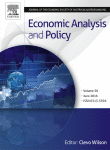
Economic Analysis and Policy
Connecting Theory and Policy for a Sustainable FutureEconomic Analysis and Policy is an esteemed academic journal published by ELSEVIER, dedicated to advancing the field of economics and econometrics since its inception in 1970. Based in the Netherlands, this journal plays a pivotal role in disseminating high-quality research that addresses contemporary economic issues and policy challenges. With an impressive Q1 ranking in both the Economics and Econometrics categories, and recognition in the top 91st percentile of Scopus rankings, it is a leading platform for scholars, professionals, and students seeking to contribute to and engage with the evolution of economic thought. The journal does not currently operate on an open access model, allowing it to maintain rigorous peer-review standards that ensure the integrity and impact of published research. As a vital resource for anyone interested in the intersection of theory and policy in economics, Economic Analysis and Policy fosters a community committed to rigorous analysis and innovative solutions in the economic domain.
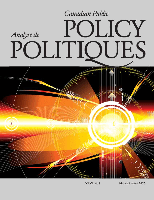
CANADIAN PUBLIC POLICY-ANALYSE DE POLITIQUES
Advancing the discourse in Canadian public policy.Canadian Public Policy - Analyse de politiques is a prominent academic journal published by University of Toronto Press Inc, dedicated to advancing the field of public policy through rigorous analysis and scholarly discourse. Since its inception in 1978, the journal has established itself as a vital resource for researchers and professionals alike, providing insights into the dynamics of public administration and sociopolitical issues in Canada and beyond. With an impressive impact factor and ranked in the Q1 quartile in both Public Administration and Sociology and Political Science categories, it is recognized for its exceptional quality and contribution to social science scholarship. The journal is indexed in Scopus, where it ranks in the top percentile for both its categories, showcasing its relevance and influence in contemporary policymaking discussions. Although it does not currently offer open access, it remains an essential tool for scholars seeking to engage with timely research and analyses that inform public policy decisions. The journal serves as a forum where academic rigor meets practical application, ensuring that new ideas foster informed practices within the realm of public policy.
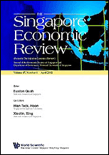
SINGAPORE ECONOMIC REVIEW
Fostering dialogue and innovation in economic theory and practice.SINGAPORE ECONOMIC REVIEW, published by WORLD SCIENTIFIC PUBL CO PTE LTD, stands as a prominent platform for research in the fields of economics and econometrics since its inception in 1983. With an ISSN of 0217-5908 and an E-ISSN of 1793-6837, this journal caters to a diverse audience by presenting high-quality, rigorously reviewed articles that address pressing economic issues both in Singapore and globally. Currently classified in the Q3 category for Economics and Econometrics for 2023, it ranks #265 out of 716 in Scopus, placing it in the 63rd percentile among economic journals. Although not open access, the articles published here contribute valuable insights into the evolving dynamics of economic theory and practice, making it an essential resource for researchers, educators, and policymakers alike. The journal's commitment to advancing economic research continues to foster dialogue and inspire innovative approaches within the academic community.
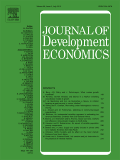
JOURNAL OF DEVELOPMENT ECONOMICS
Advancing the frontiers of development economics.JOURNAL OF DEVELOPMENT ECONOMICS, published by Elsevier in the Netherlands, stands as a premier platform in the field of development economics, showcasing rigorous research and innovative insights since its inception in 1974. With an impressive impact, this journal is ranked Q1 in both Development and Economics and Econometrics categories, placing it among the elite in social sciences, as reflected by its Scopus rankings (25th out of 306 in Development and 77th out of 716 in Economics). Although it is not an open-access journal, its contribution to advancing understanding of economic growth, poverty alleviation, and social development is invaluable. Researchers, professionals, and students will find in-depth analyses, empirical studies, and theoretical frameworks that not only address contemporary challenges but also shape future policies. Boasting a commitment to excellence and relevance, the JOURNAL OF DEVELOPMENT ECONOMICS is essential reading for anyone engaged in the critical discussions of economic development and policy.
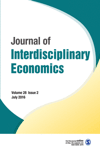
Journal of Interdisciplinary Economics
Exploring the Nexus of Economic ThoughtThe Journal of Interdisciplinary Economics, published by SAGE Publications India Pvt Ltd, is a distinguished platform for innovative research in the field of economics, promoting interdisciplinary approaches that integrate various economic theories and practices. Founded in 2004, this journal has established itself as a pivotal resource for scholars and professionals, fostering a deeper understanding of economic phenomena through empirical studies, theoretical discussions, and methodological advancements. With an ISSN of 0260-1079 and E-ISSN of 2321-5305, the journal is indexed in Scopus, achieving a commendable Q3 classification in Economics and Econometrics in 2023. As a contributor to a growing body of knowledge, authors will find an audience keen on groundbreaking insights and varied perspectives, making it an excellent venue for disseminating impactful research. Although it operates under a subscription model, the journal ensures that its high-quality content remains accessible to a wider academic community. Researchers, practitioners, and students are encouraged to engage with and contribute to this vital discourse in economic research.
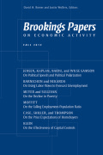
BROOKINGS PAPERS ON ECONOMIC ACTIVITY
Advancing Knowledge in Economic Activity.BROOKINGS PAPERS ON ECONOMIC ACTIVITY, published by Johns Hopkins University Press, stands at the forefront of economic research, providing critical insights and analysis across the fields of economics and econometrics. With a prestigious Q1 ranking in both the Business, Management and Accounting (miscellaneous) and Economics and Econometrics categories for 2023, this journal is renowned for its scholarly contributions that shape public policy and debates within the economic community. Since its inception, the journal has consistently published high-impact research and innovative discussions surrounding economic activity, making it an essential resource for researchers, professionals, and students alike. Although it does not offer open access, its academic rigor and relevance continue to attract a broad readership, contributing to a deeper understanding of economic phenomena in the United States and beyond. For more information, visit the journal’s homepage or the Johns Hopkins University Press website.
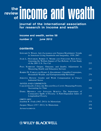
REVIEW OF INCOME AND WEALTH
Innovating Research in Economic Equity and GrowthREVIEW OF INCOME AND WEALTH, published by Wiley, stands as a premier journal in the field of Economics and Econometrics, notably ranking in the Q1 category as of 2023. With an ISSN of 0034-6586 and E-ISSN 1475-4991, it offers a platform for innovative research and critical analysis on issues pertaining to income distribution, wealth dynamics, and broader economic theories. Establishing a rich legacy since its inception between 1951 and 1953 and resuming throughout 1955 and from 1957 to 2024, the journal is pivotal for academics and practitioners alike, reaching a significant audience globally. It holds a respectable Scopus Rank of #224 out of 716 in the Economics, Econometrics, and Finance category, placing it in the 68th percentile of its field. Although it does not currently offer open access options, its commitment to disseminating high-quality, peer-reviewed research makes it an essential resource. Researchers, professionals, and students will find this journal an invaluable asset for staying abreast of the latest developments and emerging trends in economic research.

Journal of Economic Inequality
Exploring the roots and ramifications of inequality.The Journal of Economic Inequality is a leading interdisciplinary platform dedicated to advancing the understanding of economic disparities and their implications for society. Published by SpringerNature, this journal has achieved an impressive standing within the academic community, featured in the prestigious Q1 quartile across multiple categories, including Economics, Econometrics and Finance, Organizational Behavior and Human Resource Management, and Sociology and Political Science as of 2023. With an emphasis on high-quality empirical research and theoretical contributions, the journal serves as an essential resource for scholars and practitioners alike seeking in-depth insights into the mechanics of inequality. With a broad scope encompassing discussions across various fields, it provides vital perspectives that influence policy-making and social justice. Researchers will find valuable access to cutting-edge studies and the latest trends in economic research, reinforcing the journal's commitment to promoting knowledge that can lead to significant societal change. The journal operates from the Netherlands, with its editorial office located at CAMPUS, 4 CRINAN ST, LONDON N1 9XW, ENGLAND.
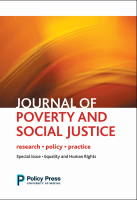
Journal of Poverty and Social Justice
Unpacking the challenges of poverty with scholarly rigor.Journal of Poverty and Social Justice, published by Policy Press, stands as a pivotal resource in the fields of Public Administration and Sociology and Political Science. With an impressive impact factor positioning it in the Q2 quartile for both disciplines as of 2023, this journal engages the academic community in critical discussions surrounding poverty, social justice, and the intricacies of policy-making. Released quarterly from its inception in 2010 and set to continue through 2024, it provides a platform for innovative research, case studies, and theoretical reflections that seek to address the multifaceted challenges of poverty and promote equitable social policies. Although not an open-access journal, it offers essential insights for researchers, professionals, and students alike, making it an indispensable reference for those committed to advancing knowledge in social justice and welfare reform.